IZM Interviews: Rose Sergent (Drawn Poorly)
Hi Rose! Happy International Zine Month! How is life going at the moment? For people who don’t know you, can you tell me a bit about yourself?
Hi Pen Fight! Things are okay thank you – I’m missing zine fairs and other DIY events that would be happening right now. I can’t wait till we can all be in those spaces again!
I’m Rose, I’m a Manchester based artist and maker. I love working on art projects that provide space for artists to try new things and develop new ideas. Making the arts accessible is prevalent in the work I do; art should be accessible to everyone. During lockdown, I’ve got much better at looking after plants and am doing loads more reading.
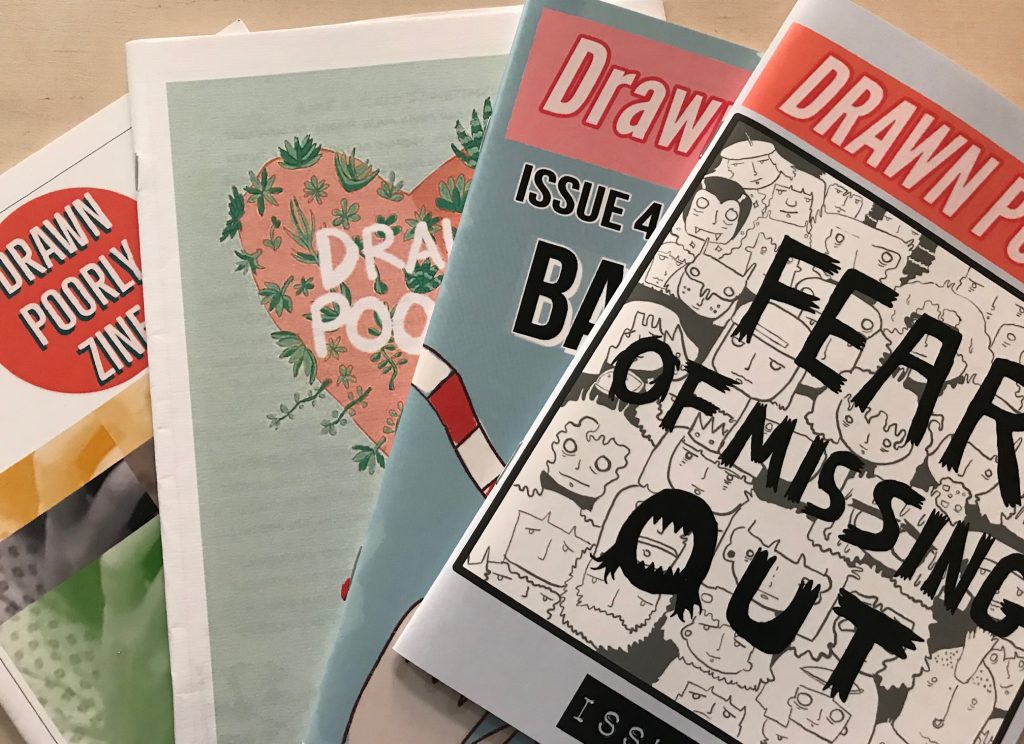
I know that your main zine is Drawn Poorly, which is a collaborative arts project for those living with chronic illness, disabilities, and mental health conditions. How did that project begin, and how have you found the process of making it? What feedback have you had – both from participants and people who’ve bought the zines?
Drawn Poorly started as a means to give space to the experiences we have as ill and disabled people. Each issue has a broad theme giving space for people to submit their own unique interpretations of it. Whether newly diagnosed, searching for diagnosis or, living with a condition or disability a long time – it can be really isolating. It felt really important to create something that was a platform for people who identify with illness and disability and, a resource for anyone who wanted to connect with others who were going through what they were going through.
A lot of the amazing ill/disabled folk I know have come through this project and social media. Before, I didn’t really know many other people like me through other means. The solidarity in shared experiences can be so affirming and, also help us to support and advocate for other ill/disabled people.
People have been lovely about the project and, it’s down to all the creatives who get involved and share their work. The latest zine has just been released and one of the artists said ‘Being given an outlet to express myself at a scary time of no treatment has been such a massive boost’.

Your most recent issue was on the theme of nature, and it’s also your longest issue yet. What do you think it is about that theme that really inspired people to create for it?
We floated the idea of making this zine about lockdown and it was mostly vetoed on a a Twitter poll. It was the right call from them because, it gave chance to focus on something broader and, more open to positive and negative interpretation.
Nature felt like a really good one to explore right now and there was a range of responses – some celebrating house plants, others reflecting on experiences in nature before lockdown, some examining their relationship to outside whilst shielding.
As well as making zines you’re also a workshop facilitator. From my experience of your workshops I’ve noticed that you really created a space where people didn’t just make zines, but also could talk openly about things that could be quite personal. Is that an atmosphere you intentionally try to make, or is there something about zine making that naturally brings that out in people?
Ah that’s really nice to hear thank you! Partly I think this comes with hosting a space specifically for ill/disabled creatives. It’s really exciting to know you’re in a space with other people who understand your experiences without needing to explain them. Zine spaces are open and supportive too and making a zine can be a really cathartic experience.
I saw on twitter recently that you plan to run some online zine clubs, can you tell me a bit more about that, and how people can take part, and support the sessions?
That’s right there will be zine clubs coming soon! I’m presenting them with Glasgow Zine Library over August – more details will be posted on social media soon.
The zine clubs will be a space for makers to get together virtually over the coming months. There will be some zine prompts and guidance on how to make mini zines for anyone who hasn’t made before. It’ll be pretty relaxed and an opportunity for people to chat and share what they’re working on.
As things are starting to reopen and go back to how they were, it feels important to still offer space digitally. In our last workshop with Glasgow Zine Fest, we talked a lot about how a lot of organisations and projects had been so much more accessible for ill/disabled people during lockdown. We want to make sure there is still that space.
You’re also an illustrator – can you tell me a bit about your work, and what your dream project would be?
I’m actually working on a project at the minute with Lost Robot Studios which is a real dream! With support from their micro fund, I’m exploring venues and accessibility. I’m a DIY punk fan and, often there are so many small changes that can be made to make spaces more accessible for ill/disabled punks. Our venues of course are struggling right now and, we’re living in precarious times for our DIY musicians – it does feel like a strange time to make this work. My hope is that, when they reopen, we can have these conversations and spaces will be more accessible than ever before.
Do you have any tips you can share – on making zines, or running workshops (especially in an accessible way)?
For making zines digitally: Clear fonts (Ariel or Calibri are good) for main bodies of text, size 14 font and above and decent spacing (1.5 works well!). I’ve heard of other zines creating audio described versions of their issues which is brilliant.
Workshops: If you’re in a physical space, be really clear to participants the accessibility of the spaces. If you’re making zines about potentially triggering topics, ask participants to check in with other members of the workshops to see if they feel comfortable with that being discussed. I like running short activities too to bring focus to the session.
Can you share some of your favourite things from the zine world?
Ah for sure! So obviously a huge Pen Fight fan, since getting into zines, Pen Fight has always had an amazing selection of zines to read. Also, the best badges (Straight white boys don’t own punk is one of my all time favourites).
I’ve just read Mixed Rage which is a brilliant zine sharing experiences of being mixed race and the frustration of feeling ‘other’. They’re looking for submission for their next issue.
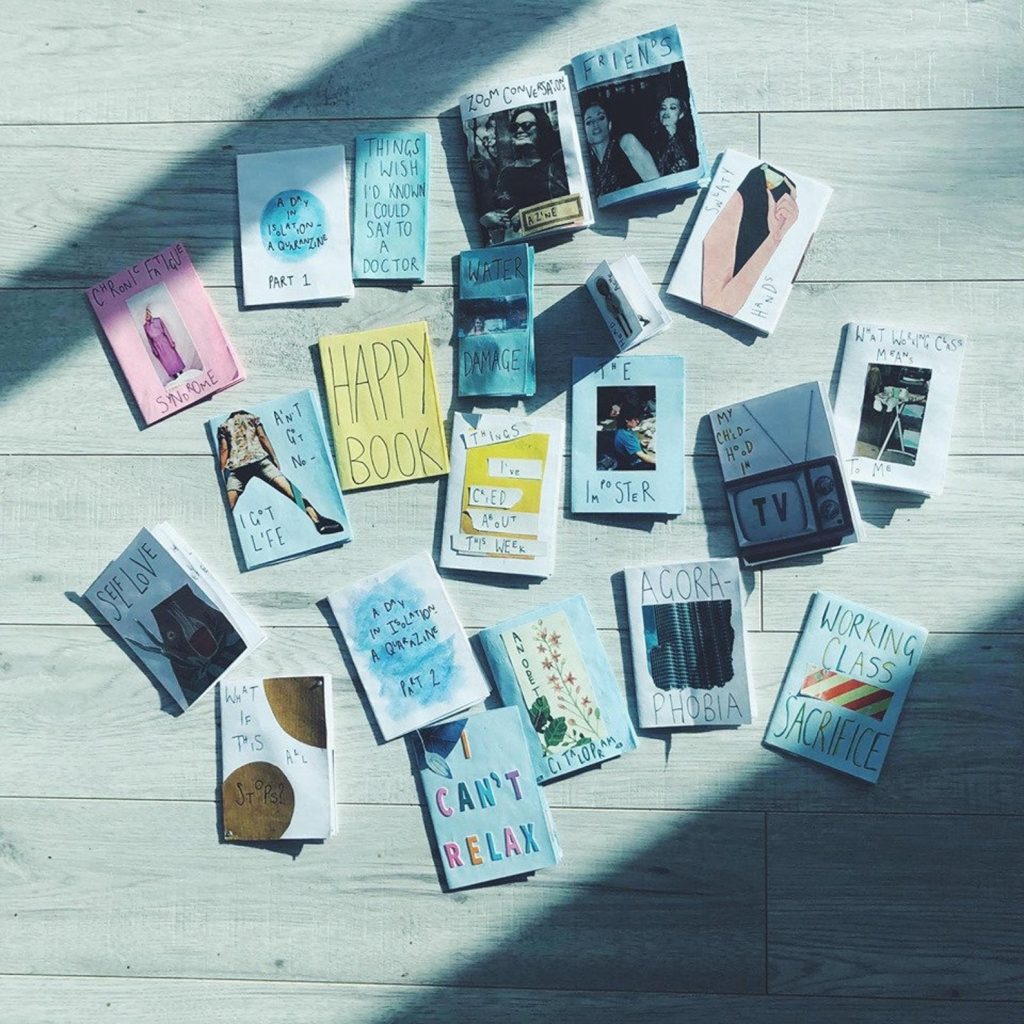
This.Is.Your.Life.Zine is another I’m reading a lot. They share these beautiful mini zines on their Instagram page featuring so many topics including M.E diagnosis, chronic fatigue, solo dates and otters just to name a few!
There are so many zines, distros and makers I love it’s definitely hard to choose. Some of my favourites are Holly Casio, Brown Girls Do It, Cath Garvey, Three Paws Press, Hidden Ink Child, Bear With Lee, Seleena Laverne Daye.
Do you have any recommendations you want to share? Things that inspire you, artists, books, or anything else you’re enjoying at the moment?
I’m really loving the art of Lou Lou Reed. Check them out for sure!
Ryan Courtier’s work was featured on the front page of Drawn Poorly Issue Six. He makes amazing collage work.
I’ve just read Revolting Prostitutes: The Fight for Sex Workers Rights by Juno Mac and Molly Smith and Sanatorium by Abi Palmer. Would recommend both of them for sure.
Do you have any projects you’re working on right now that you’d like to tell people about?
I’ve just finished some illustration work for Contact, for their The Lost Summer project. It’s a really ace opportunity to share responses to lost summers past and present would love to see some zine makers get involved: https://contactmcr.com/development/the-lost-summer/
If you enjoyed this article please consider giving a tip via ko-fi so I provide more content like this ♥
IZM Interviews: Cath Garvey (Job Haunting)
Hi Cath, Happy International Zine Month! How is life going at the moment? For people who don’t know you, can you tell me a bit about yourself?
Hi Vicky! I’ve been keeping myself busy, thankfully. I’m a Liverpool Illustrator who makes comics and zines on aliens, ghosts and self-help.
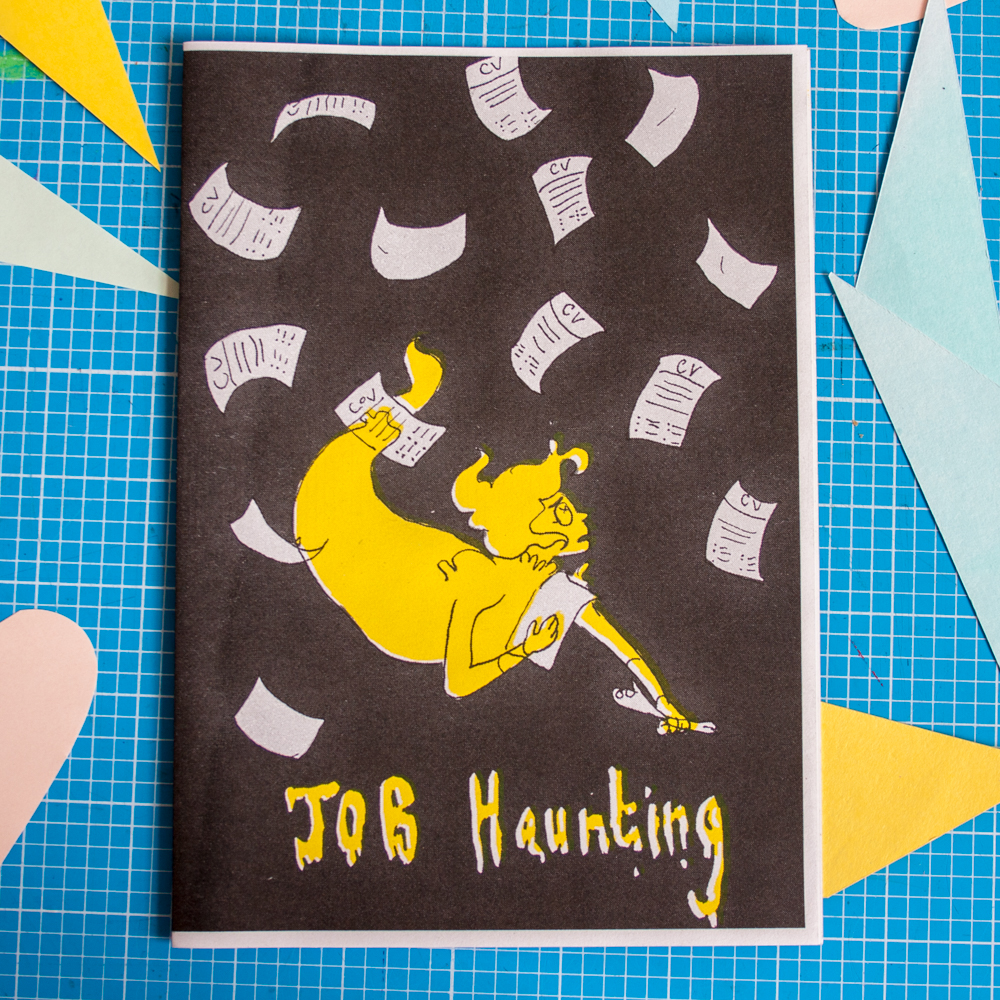
The zine of yours, Job Haunting, that we put out via Pen Fight Press, is a comic about a ghost who’s job hunting. What inspired that zine, and why did you make your main character a ghost?
My circumstances inspired my zine, I lost my job and went on Universal credit after University. I was frustrated and tired by how I was treated so I made short comics to vent. The character is a ghost because it was how I felt at the time and my state of mind. Also, constant movement and shakiness the ghost has best shows how unstable the whole situation feels.
You recently adapted the zine into a short animation – can you tell me more about the process of creating the animation and the release of it?
I pitched the zine to BBC New Creatives to help me develop and offer funding to animate it. I got it, went up to Newcastle, met the other film makers who also received the funding and then I went on holiday. Because of Brexit.
When I got back from Holiday, I spent a lot of time on the script, which had 8 drafts by the end. I found it pretty hard to keep everyone happy, while also keeping my message honest. New Creatives introduced me to Fettle Animation, who were great to work with and taught me a lot. They animated most of the scenes, while I worked on the office scenes and graveyard.
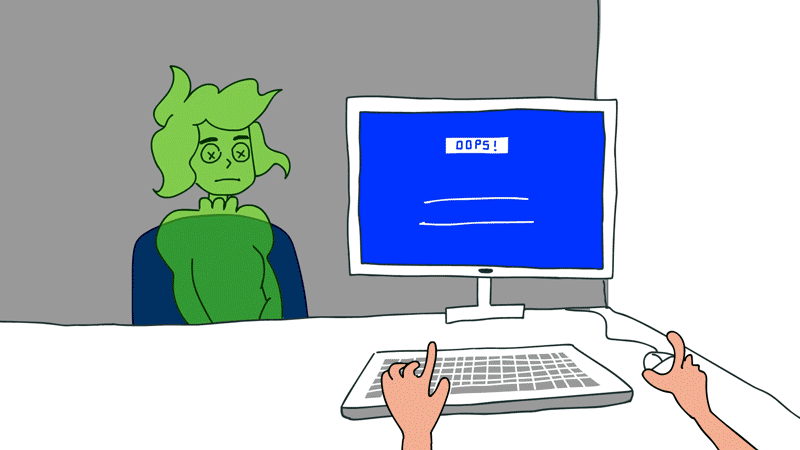
The best part of making my animation was the voice actresses, I wanted my ghost to be played by a Liverpool actress. And it was really hard to find an actress that was from Liverpool. A lot of talent agencies don’t hire people from Liverpool and when they do, they’re encouraged to lose the accent completely. It took a while to find the right person, to the point I was certain we won’t find anyone. Then Fettle Animation found Katie George, who did an amazing job and was exactly the voice I needed. And I’m so so so glad I insisted on having a Liverpool voice, it really wouldn’t have been the same if I went with any other accent.
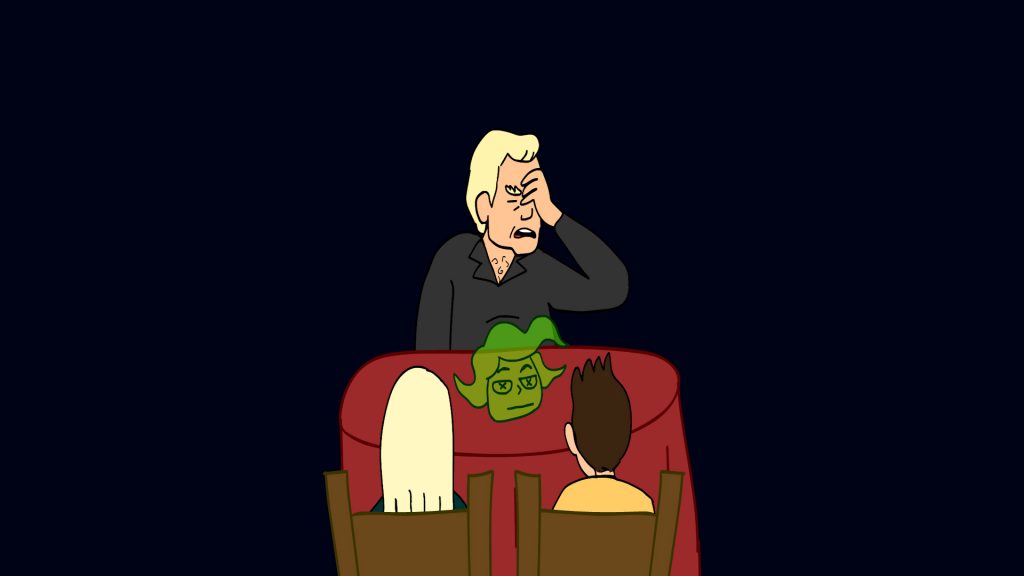
After that it was 2 months straight of animating, which I was ill for most of it. Once done we sent it off to the BBC. The animation aired on BBC Four on a show called Get Animated.
You also teach comic-making workshops, what kind of responses have people had to being introduced to comic making? Have you been able to adapt to teaching in our current social-distancing time?
I love teaching and I love seeing what people come up with. I grew up with not knowing anything about DIY zine culture or even the suggestion that I could make money from art. So running workshops in my area for kids is really important to me. Often people are impressed by making mini zines, which is fun to see. I’ve been running workshops over Zoom the past few weeks, which I was really nervous about. I’m usually camera shy so running a workshop over video was daunting at first. But the workshops have gone really well and I can confidently say I will be running more Zoom workshops in the future. I also want to keep them free, so applying for funding is the next step at the moment.
Money is one of the biggest barriers for people wanting to learn something new or even to have fun. I want my workshops to be accessible to everyone and it’s something I want to continue to do.
You’ve created a few stories about working class experiences and characters – do you find comics and animations a good medium for sharing those stories? Have there been any challenges to you as a working-class creative freelancer?
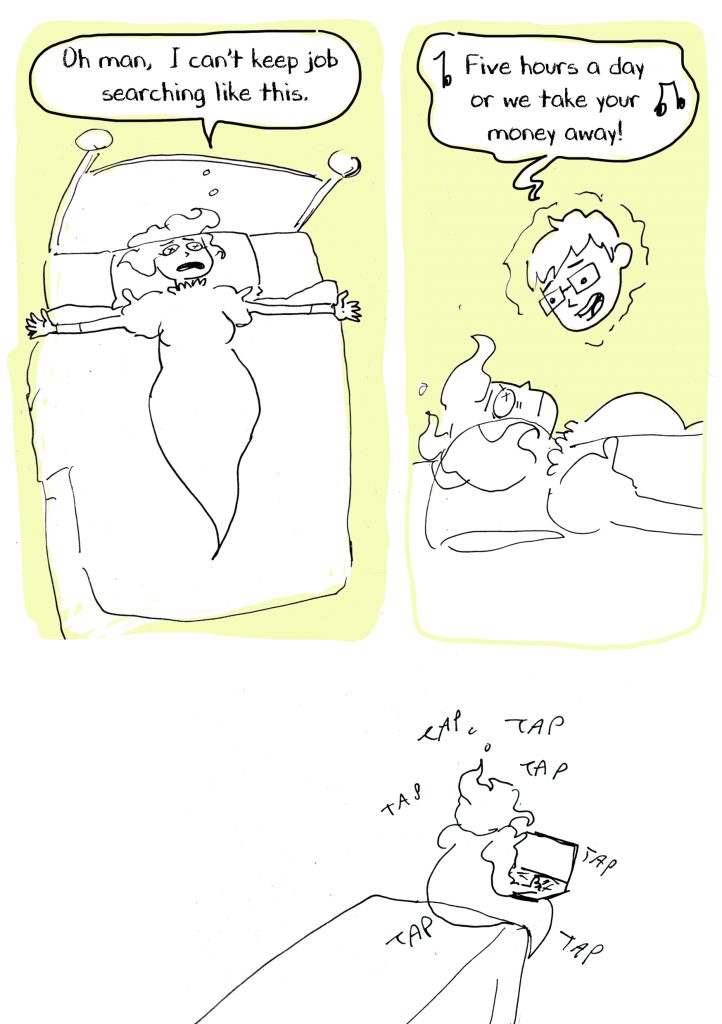
I’d say comics is better than animation- unless you have full control in what you animate. With animation things can be edited and cut, while comics are much rawer and you can go dive deeper into the subject.
I found it/still find it hard as a working class creative. After University, I desperately wanted to work in an animation studio. I reached out to numerous studios for work experience and none of them ever got back in touch. It is simply who you know and I didn’t know them. I ended up giving up on that approach and just focused on smaller ways I could make money from my art while also working in hospitality. I also got to the point where I couldn’t work for nothing, I needed income and internships/work experience wasn’t something I was comfortable doing anymore.
But I did finally get my first big art job running workshops over the summer for a gallery and I’ve been gradually receiving more and more work since then. But don’t get me wrong, I applied for many art opportunities before then and I also moved back to my parents. Thanks to moving back home, I had time to work on my art practice and I didn’t need to be working a job I hated to keep a roof over my head. A lot of successful artists have savings to help them to develop their art and allow time for them to become established.
What inspires your work more broadly? What’s your favourite kind of project to work on?
I love comedy and I’m obsessed with watching Trixie and Katya at the moment, they’re both drag queens who have a show called UHNHhhh on Youtube. They are so so so funny. I find my sense of humour and timing to be pretty good and that’s thanks to the things I watch and the people around me.
I recently worked on a gardening comic/guide for a local art organisation, Heart of Glass. I made a comic where a Bee basically bullies a person to grow plants. I love working on projects that I can give on odd spin on, whilst making it educational.
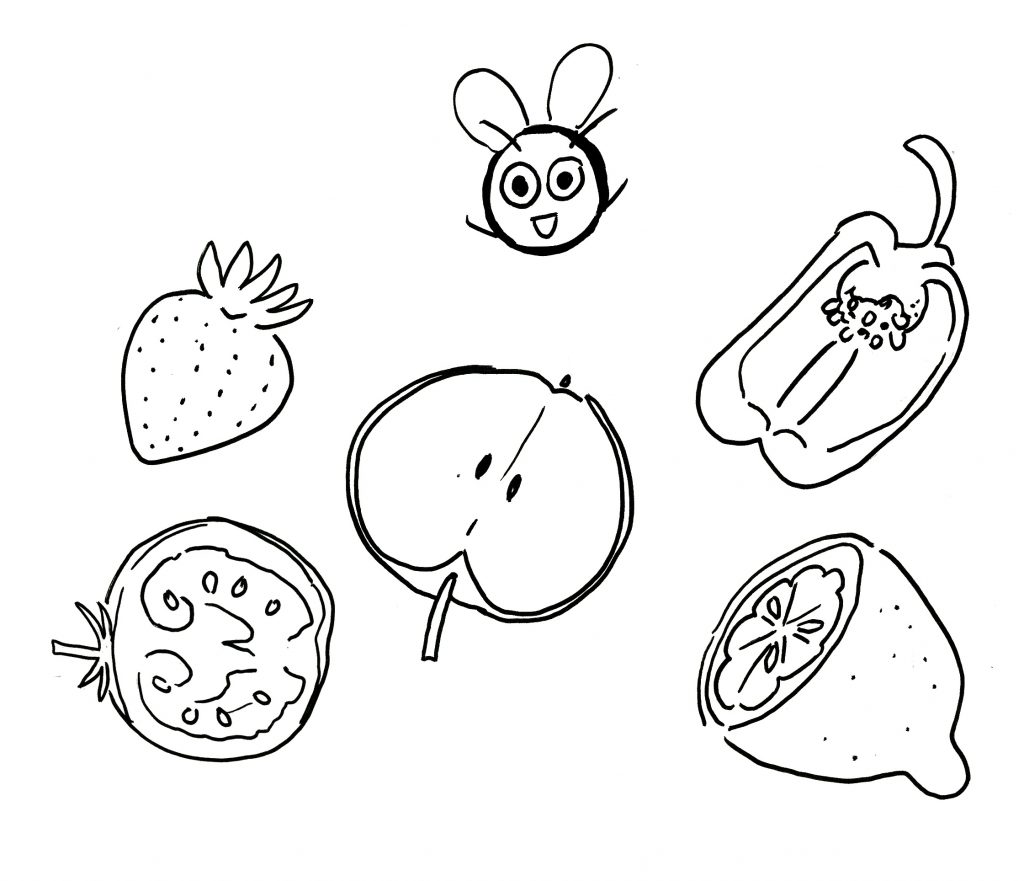
Do you have any tips you can share – on making comics or getting into freelancing?
You need to think out the box sometimes and be open to try new things. I’d say if you’re starting off you probably need to be working part time whilst freelancing as freelancing has its dry spells. Ultimately, be true to yourself, your beliefs and channel that into your work.
And finally, don’t beat yourself up for not getting regular work. It doesn’t make you any less of an artist or creator.-
Can you share some of your favourite things from the zine world?
Check out Rooted Zine! It’s a zine supporting Black creatives and they are really passionate. I met the Co-founder Amber Akaunu whilst in Newcastle, and turned out we are both Liverpool girls. They’ve just brought out a new issue so go support them!!!
Do you have any recommendations you want to share?
I’m working on growing food at the moment, I want to grow pumpkins so I can make my own pumpkin pie from scratch in the autumn. I advise people to give gardening a try, it really helps you mentally and it’s really rewarding to eat fresh veg and fruit you’ve grown yourself!
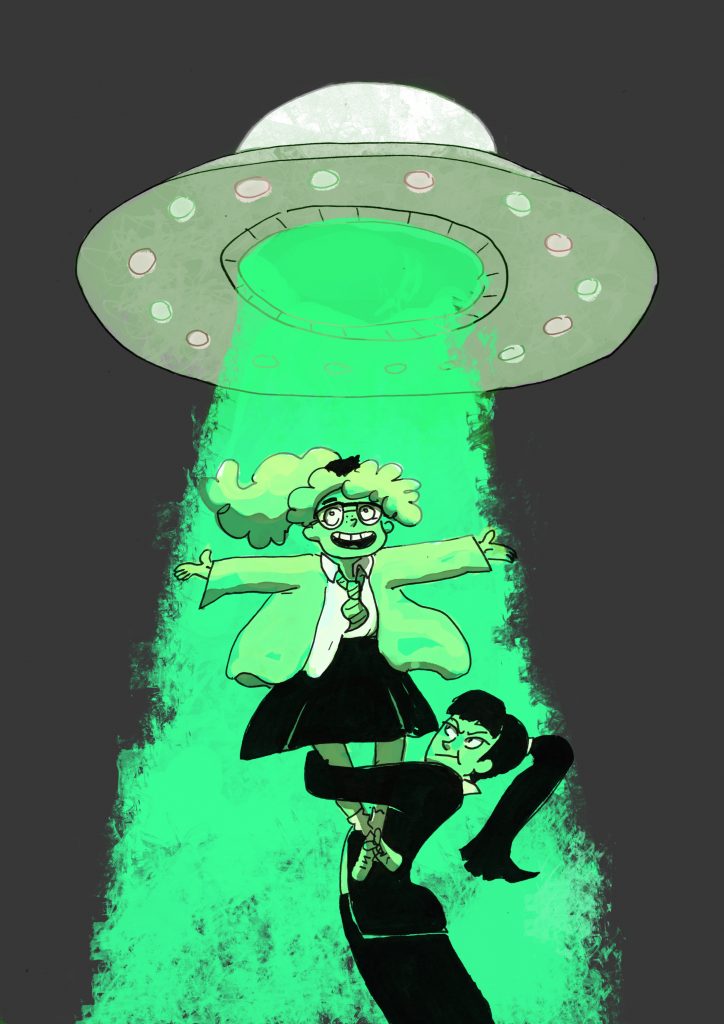
Do you have any projects you’re working on right now that you’d like to tell people about?
I will be posting a comic I’m working on with my sister in August. It’s a story about an alien fanatic and an alien in disguise. It’s a series that’s both funny and a bit sad at times. The comic will be posted on my Instagram, so go give me a follow.
Is there anything else you’d like to promote?
Follow me on Instagram and Twitter with the handle cath_garvey.
I’m available to run workshops, editorial work, animation jobs and comic work. I’m a jack of all trades. If you want to pop me the question here’s my email: catherinegarvey@outlook.com
If you enjoyed this article please consider giving a tip via ko-fi so I provide more content like this ♥
